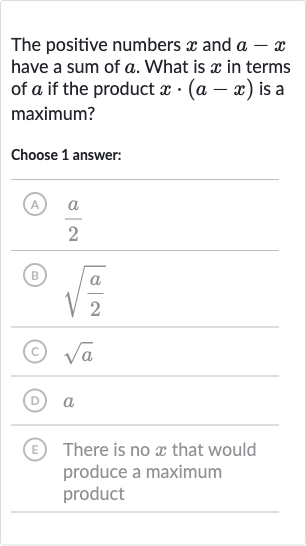Full solution
Q. The positive numbers and have a sum of . What is in terms of if the product is a maximum?Choose answer:(A) (B) (C) (D) (E) There is no that would produce a maximum product
- Equation Simplification: We know that . This simplifies to , which means cancels out and we're left with , which is true but doesn't help us find .
- Maximizing Product: To maximize the product , we can use the fact that for a fixed sum, the product of two numbers is maximized when the numbers are equal. So, we set .
- Solving for x: Solving for x gives us , which simplifies to .
- Isolating : Divide both sides by to isolate , we get .

